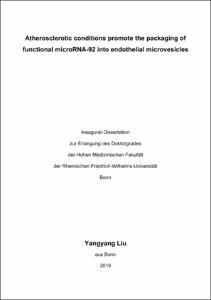Atherosclerotic conditions promote the packaging of functional microRNA-92 into endothelial microvesicles

Atherosclerotic conditions promote the packaging of functional microRNA-92 into endothelial microvesicles

| dc.contributor.advisor | Werner, Nikos | |
| dc.contributor.author | Liu, Yangyang | |
| dc.date.accessioned | 2020-04-25T16:33:48Z | |
| dc.date.available | 2020-04-25T16:33:48Z | |
| dc.date.issued | 27.03.2019 | |
| dc.identifier.uri | https://hdl.handle.net/20.500.11811/7697 | |
| dc.description.abstract | Objectives: Microvesicle (MV)-incorporated microRNAs (miRs) are biomarkers and effectors of cardiovascular diseases. Whether MV-miRs expression is regulated in coronary artery disease (CAD) is unknown. We aimed to explore the expression of circulating MV-miRs in patients with CAD. Methods and results: Circulating MVs were isolated from patients’ plasma using ultracentrifugation. The electron microscope was used for MVs size characterization. Taqman miR array revealed that MV-miRs are significantly regulated in patients with stable CAD compared to ACS patients. To validate miR array results, 180 patients with angiographically excluded CAD (n=41), stable CAD (n=77) and acute coronary syndrome (ACS, n=62) were prospectively studied. Nine miRs involved in the regulation of vascular performance - miR-126, miR-222, miR-let7, miR-21, miR-26, miR-92, miR-133, miR-30 and miR-199 – were quantified in circulating MVs by real-time PCR. Among those, miR-92 was significantly increased in patients with CAD compared to non-CAD patients. MV-sorting experiments showed that endothelial cells (ECs) were the major cell source of MVs (EMVs) containing miR-92. In vitro, oxLDL stimulation dose-dependently increased miR-92 expression both in EMVs and ECs in a STAT3-dependent way. MiR-92 and EMV labeling demonstrated that functional miR-92 was transported into recipient ECs promoting EC migration and proliferation. Knockdown of miR-92 in EMVs abrogated EMV-mediated effects on EC migration and proliferation and blocked vascular network formation in matrigel plug. PCR-based gene profiling showed that the expression of THBS1, a target of miR-92 and an inhibitor of angiogenesis, was significantly reduced in ECs by EMVs. Knockdown of miR-92 in EMVs abrogated EMV-mediated inhibition of THBS1 gene and protein expression. Conclusion: Atherosclerotic conditions promote the packaging of endothelial miR-92 from ECs into EMVs. EMV-mediated transfer of functional miR-92 regulates angiogenesis in recipient ECs in a THBS1-dependent mechanism. | |
| dc.language.iso | eng | |
| dc.rights | In Copyright | |
| dc.rights.uri | http://rightsstatements.org/vocab/InC/1.0/ | |
| dc.subject | Coronary artery disease | |
| dc.subject | microRNA | |
| dc.subject | microvesicles | |
| dc.subject | endothelial cell-derived microvesicles | |
| dc.subject | angiogenesis | |
| dc.subject.ddc | 610 Medizin, Gesundheit | |
| dc.title | Atherosclerotic conditions promote the packaging of functional microRNA-92 into endothelial microvesicles | |
| dc.type | Dissertation oder Habilitation | |
| dc.publisher.name | Universitäts- und Landesbibliothek Bonn | |
| dc.publisher.location | Bonn | |
| dc.rights.accessRights | openAccess | |
| dc.identifier.urn | https://nbn-resolving.org/urn:nbn:de:hbz:5n-53845 | |
| ulbbn.pubtype | Erstveröffentlichung | |
| ulbbnediss.affiliation.name | Rheinische Friedrich-Wilhelms-Universität Bonn | |
| ulbbnediss.affiliation.location | Bonn | |
| ulbbnediss.thesis.level | Dissertation | |
| ulbbnediss.dissID | 5384 | |
| ulbbnediss.date.accepted | 29.01.2019 | |
| ulbbnediss.institute | Medizinische Fakultät / Kliniken : Medizinische Klinik und Poliklinik I - Allgemeine Innere Medizin | |
| ulbbnediss.fakultaet | Medizinische Fakultät | |
| dc.contributor.coReferee | Latz, Eicke |
Files in this item
This item appears in the following Collection(s)
-
E-Dissertationen (1582)




